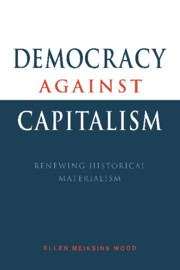Book contents
- Frontmatter
- Contents
- Acknowledgements
- Introduction
- I HISTORICAL MATERIALISM AND THE SPECIFICITY OF CAPITALISM
- 1 The separation of the ‘economic’ and the ‘political’ in capitalism
- 2 Rethinking base and superstructure
- 3 Class as process and relationship
- 4 History or technological determinism?
- 5 History or teleology? Marx versus Weber
- II DEMOCRACY AGAINST CAPITALISM
- Conclusion
- Index
5 - History or teleology? Marx versus Weber
Published online by Cambridge University Press: 13 October 2009
- Frontmatter
- Contents
- Acknowledgements
- Introduction
- I HISTORICAL MATERIALISM AND THE SPECIFICITY OF CAPITALISM
- 1 The separation of the ‘economic’ and the ‘political’ in capitalism
- 2 Rethinking base and superstructure
- 3 Class as process and relationship
- 4 History or technological determinism?
- 5 History or teleology? Marx versus Weber
- II DEMOCRACY AGAINST CAPITALISM
- Conclusion
- Index
Summary
Marx versus Weber has long been a favourite fixture among academics – or, to be more precise, Weber has been a favourite stick with which to beat Marxists: Marx is a reductionist, an economic determinist; Weber has a more sophisticated understanding of multiple causes, the autonomy of ideology and politics; Marx's view of history is teleological and Eurocentric, Weber's more attuned to the variability and complexity of human culture and historical patterns. Weber is the greater sociologist and a better historian because, where Marx over systematizes, reducing all cultural and historical complexities to a single cause and one unilinear historical process, Weber, with his methodology of ‘ideal types’, acknowledges complexity and multi-causality even as he subjects them to some kind of conceptual order.
Yet is it really so? Or should the shoe be on the other foot? In what follows, it will be argued that it is Weber, not Marx, who looked at the world through the prism of a unilinear, teleological and Eurocentric conception of history, which Marx had done more than any other Western thinker to dislodge. Far from advancing social theory beyond the alleged crudities of a Marxist determinism, Weber reverted to a pre-Marxist teleology, in which all history is a drive – though sometimes, perhaps more often than not, thwarted – toward capitalism, where the capitalist destination is always prefigured in the movements of history, and where the differences among various social forms have to do with the ways in which they encourage or obstruct that single historical drive.
PROGRESS AND THE RISE OF CAPITALISM
The idea of progress commonly associated with the Enlightenment was made up of two distinct but related strands.
- Type
- Chapter
- Information
- Democracy against CapitalismRenewing Historical Materialism, pp. 146 - 178Publisher: Cambridge University PressPrint publication year: 1995

